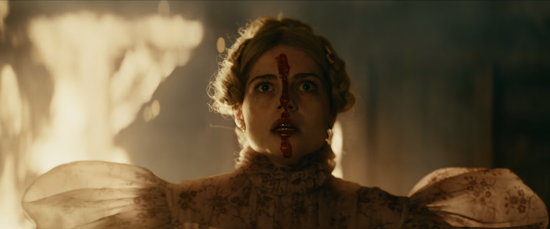Not one, but two movies were released in 2022 featuring a young Edgar Allan Poe solving occult-tinged crimes during his failed stint at West Point. It's such a bizarre, specific premise; I guess Shanghai Noon did it with Arthur Conan Doyle, so there's some sort of precedent, but the equivalent would be to do a serious movie and send him against... I don't know, The King in Yellow instead.
Fuck, I would so watch that! And maybe after that someone can make a movie about Brett Easton Ellis killing random people while researching American Psycho. Someone please get on that please, thanks.
Unlike Raven's Hollow, which was a proper (if scatterbrained) indie horror film, Scott Cooper's The Pale Blue Eye is a relatively prestigious affair, a more down-to-earth investigation of a series of occult-tinged murders shaking the West Point military academy in the early nineteenth century. It's... kind of terrible.
Poe arrives relatively late to the film; The actual protagonist is one Augustus Landor (Christian Bale), a retired, world-weary constable living in a small cottage near the academy grounds. Get it? It's a deep cut, but as clunky as any of these references ever are.
Landor is introduced with some really tiresome exposition - something the movie indulges in quite a bit - from the two old fuddy-duddy academy officers who hire him as an investigator; Simon McBurney and Tim Spall play these (real life historic) figures extremely broadly - McBurney in particular seems constantly poised to bluster a "well I never!". It's not a good fit with the film's dead-serious tone, but these sort of bone-headed, simplistic choices abound.
Mr. Landor's task is to find out more about the strange circumstances surrounding the death of one of their cadets: found hanged from a tree, a presumed suicide, his heart removed from the corpse at the morgue by unknown parties. As the investigation proceeds another cadet - Mr. Poe (Harry Melling) - insinuates himself into the investigation and quickly makes himself indispensable. Of course, new murders pop up as Landor and Poe stir things up, complications ensue, etcetera. The resolution to the mystery is kind of bonkers, and not really in a good way: The people who you thought were guilty all along end up being guilty, but their motives and the specifics of the crimes... it's a fairly shitty mystery.
And the movie meanders - oh sweet baby Dagda does it ever meander, including a ridiculous twist that gives the film yet another excuse to indulge in further reams of exposition. Just when you thought the worst was behind you. The film is two hours ten minutes, and every second is deeply felt.
The acting is both a strong and a weak point. There are a bunch of bizarre choices that seem to come from a much stranger movie, one with a sense of humour. Gillian Andersen comes to mind, as well as Simon McBurney and, to be honest, much of Meling's performance. I've liked Melling in other movies, but found the tonal clash variably annoying here. The heavy makeup he's saddled with is partly to blame - it does make him look strikingly like Poe, but mainly I just found it distracting.
There are a few other actors I thought were pretty bad - mostly within the ranks of the cadets. On the other hand, there's a killer's row of talent like Bale, Toby Jones, Charlotte Gainsbourg and Robert Duvall to make up for the rest.
It does look fairly good. Nothing to write home about, but cinematographer Masanobu Takayanagi provides an evocative, chilly palette for exteriors, all colour drained except the blue of the cadets' uniforms, and sumptuously candlelit interiors. And I also liked Cooper's direction - there's a few scenes that are technically memorable: a tracking shot here, a matching cut there...
His script, though, could have done with a lot more work. It's based on a well-regarded novel by Louis Bayard which I'd never heard of before. I have no idea how many of the movie's problems are inherited from the source material; Its complete lack of streamlining, for one, cannot be blamed on the book.

No comments:
Post a Comment